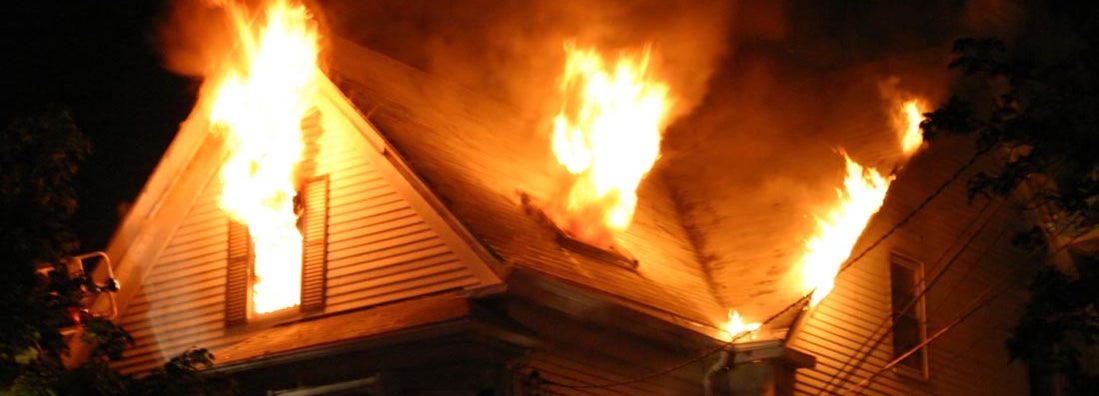New Jersey Fire Insurance
Find the right fire insurance policy for you.

New Jersey is one of the smallest states in America, ranking 47th out of 50 in geographical size. Yet, in population, it comes in at number 11, with over 8.8 million residents. Not surprisingly, that makes New Jersey number one in density. This situation creates the perfect environment for fire damage since fires so easily spread from one structure to another. If you own property in the state, New Jersey fire insurance is one of the most important aspects of property protection.
Fires are a remarkably destructive force and can be a source of financial ruin, as the recent NJ boardwalk fire demonstrated. Finding the right New Jersey fire insurance policy can be easier than you think when you consult with an independent insurance agent in our network. These professionals work with multiple insurance companies that can deliver several different New Jersey fire insurance quotes for you to compare. Find a local member agent today to be certain you have proper coverage at the best price available.
New Jersey Fire Statistics
- New Jersey experienced a fire every 20 minutes and 34 seconds
- There were 458,568 responses by NJ fire departments
- 29,625 fires were reported in the state
- 299 civilians were injured and 61 died
- 82% of reported fires involved residential property
- 57% of reported residential fires involved either a 1 or 2 family dwelling such as a home, condo or duplex
How Does Fire Insurance Work?
Fire insurance coverage is a primary feature of most standard homeowners or renters insurance policies. However, policies and the coverage they provide can vary from company to company. It is important to read your policy and understand any exclusions. Unfortunately, many people are unaware of the specifics of their policies and only "read the fine print" when they try to file a claim. Here are some important things to know about coverage for fire:
- Coverage limits: Most policies will only cover a percentage of the total market value of your home and belongings.
- Replacement cost vs. actual cash value: Insurance companies use two different methods to determine the reimbursement amount in the event of a loss.
- Actual cash value (ACV): The insurance company compensates you for the value of your property minus depreciation.
- Replacement cost: The insurance company compensates you for the actual replacement cost of your property.
- Personal property limits: Almost all policies have limitations for certain personal items, such as valuable collectibles, artwork and jewelry. You may need an additional insurance rider listing items of special value to make certain you have full insurance coverage for these items. You may be required to get an appraisal on valuables, collectibles and antiques.
- Other structures: Your home policy may or may not include coverage for any detached structures such as a utility shed or a separate garage. Be sure to review this with your agent.
- Temporary living: Many policies provide an additional allowance for the cost of temporary living accommodations if you have to vacate a residence due to a fire loss.
- Vehicles: The comprehensive portion of most auto policies covers vehicles for fire regardless of where they are located. However, if the car does not have full coverage, it may not be protected, regardless of the source of the fire.
Fire Insurance Coverage Amounts
Before purchasing your homeowners policy, take the time to carefully assess your situation. An agent can help. Your agent will likely recommend that you inventory everything on the property, including any detached buildings. Your next step is to determine how much it would cost to replace everything at current prices. This will give you an idea of how much fire insurance you need. The easiest way to document your personal belongings is to take videos or photographs and store them off-premises.
Reasons Why a Fire Claim Can Be Denied
Every fire insurance policy outlines specific reasons for which a fire claim may be denied. These are known as exclusions, and they typically include:
- The insured failed to report a fire to the local fire department.
- The residence was not equipped with smoke detectors, fire extinguishers or sprinkler systems.
- The fire was a result of the property owner's gross negligence.
Finding Quality New Jersey Fire Insurance
Fires will always be a source of permanent damage since not all personal belongings can be replaced. Family photos, your child's first pair of shoes, and other precious heirlooms cannot be replaced. What is within your power is making sure that a fire does not devastate you financially. One good way to confirm that your home policy includes New Jersey fire insurance is by getting in touch with a local independent agent in our network. These agents can compare your existing protection to New Jersey fire insurance quotes from other companies to confirm you have full coverage at a price that meets your budget requirements.
Contact an independent member agent for assistance today.
